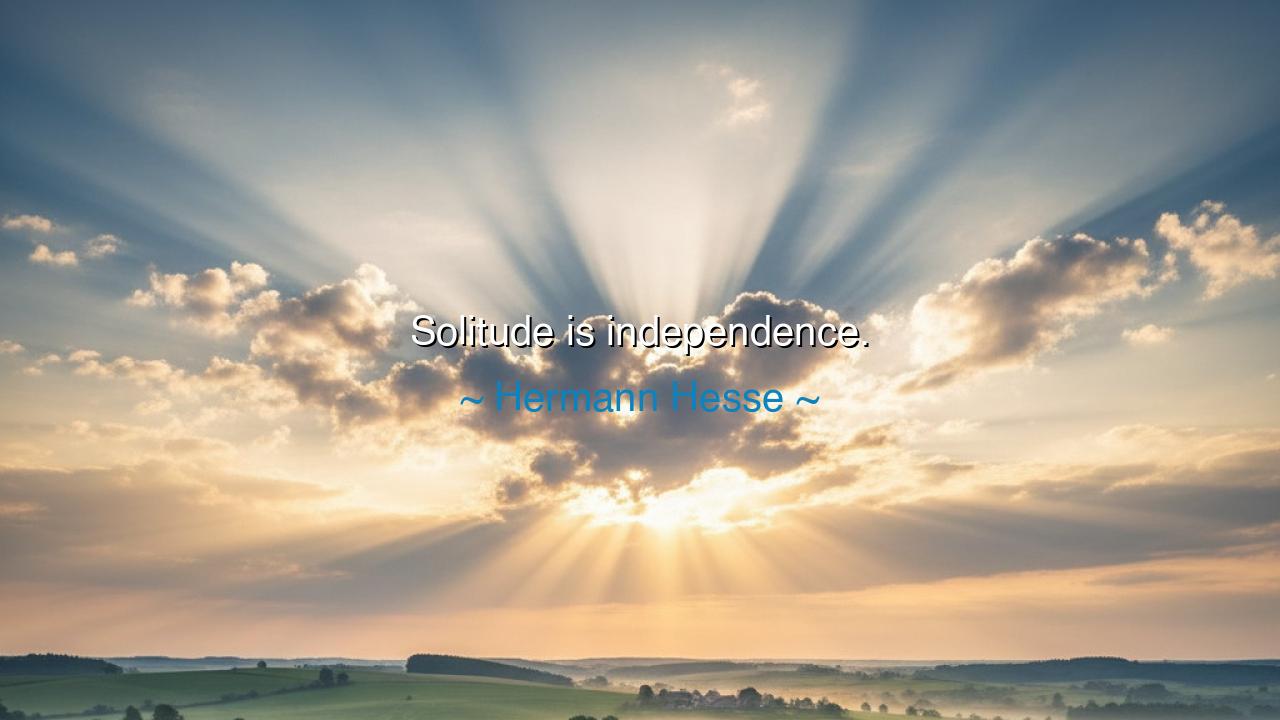
Solitude is independence.






“Solitude is independence.”
Thus wrote Hermann Hesse, the wandering mystic of the modern age, whose spirit sought truth beyond the noise of civilization. In these few words lies a wisdom as old as humanity itself — the realization that to stand alone is to stand free. Solitude, to Hesse, was not exile, but empowerment; not the absence of others, but the presence of one’s own soul. In a world that pulls us constantly outward — toward approval, noise, and distraction — he reminds us that the truest freedom is found not in conquest of the outer world, but in mastery of the inner one.
To dwell in solitude is to dwell in the realm of one’s own thoughts, unshaped by the judgments of the multitude. It is there that the self ceases to be a shadow of others and becomes a flame unto itself. The ancients knew this truth well. The philosophers of Greece withdrew into the groves, the sages of India retreated to the mountains, and the prophets of the desert sought silence among the sands. They did not flee mankind out of disdain, but out of necessity — for only in solitude could they hear the whisper of the divine. Independence, then, is not rebellion against the world, but reconciliation with one’s own being.
Hesse himself lived through the storms of two world wars, through the collapse of values and the rise of mechanical living. In such a time, solitude became his fortress and his forge. Through isolation, he wrote Siddhartha and Steppenwolf, works that spoke of the struggle between self and society, between the comfort of belonging and the courage of being alone. He believed that the individual must learn to walk alone if he is ever to find truth — for dependence upon the crowd leads only to conformity, and conformity is the slow death of the soul. Thus, when Hesse declared that solitude is independence, he offered not a retreat, but a path — the path of inner sovereignty.
There is an ancient tale that mirrors this truth: the story of Diogenes, the philosopher who lived in a barrel in the streets of Athens. Kings and scholars mocked his poverty, but Diogenes was free in a way none of them were. When Alexander the Great offered to grant him any wish, the old man replied, “Stand out of my sunlight.” In that moment, he proved that true power lies not in possession, but in detachment. Diogenes’ solitude was his kingdom, his independence from the desires and illusions that enslave most men.
Solitude, when embraced with courage, purifies the mind. It strips away pretense, revealing what is essential and eternal. Yet solitude is not for the faint-hearted — it demands honesty. When you are alone, there is no one to blame, no one to impress, no one to distract you from your own reflection. It is there that a person learns whether they are truly free or merely escaping. To face oneself in silence is to stand before both shadow and light — to know weakness and still choose strength. This is why solitude is the anvil upon which the soul’s independence is forged.
But solitude does not mean abandonment of love or of humanity. The one who has learned to be alone becomes the one most capable of compassion, for they no longer love out of need, but out of fullness. Such a soul brings peace, not hunger, into their relationships. To depend on others for meaning is bondage; to share from one’s wholeness is grace. The man or woman who has made peace with solitude walks among others like a calm flame — untouched by chaos, yet warm to all who draw near.
The lesson of Hesse’s words is simple yet eternal: seek solitude not as escape, but as discovery. Spend time each day in quiet reflection — away from the voices of the world. Walk beneath the sky without a device in hand; listen to your own thoughts until they grow clear and still. Create something, read deeply, or simply breathe. In those moments of aloneness, you will begin to hear your true self calling, and you will find that the chains of fear and approval loosen.
For in the end, solitude is not emptiness — it is sovereignty. It is the state in which the spirit stands upright and unafraid, beholden to none, sustained by its own light. When you can be alone and still feel whole, when you can walk your path without needing the crowd’s applause, then you will have found what Hesse called independence — the quiet majesty of a soul that belongs only to itself.






AAdministratorAdministrator
Welcome, honored guests. Please leave a comment, we will respond soon